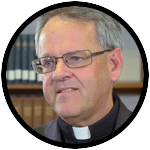
Father Thomas Dailey, O.S.F.S.
Life should have a speed limit. Then again, it would probably be ignored just like the one posted on the highway.
Everyone is in a hurry. Everything needs to be done by yesterday. We never seem to have enough time.
And so we rush. We think that if we drive faster, we’ll get there sooner. We suppose that if we multitask, we can get more done. Too often some people try to do both simultaneously.
Our digital environment no doubt contributes to the hurried and harried sense of contemporary life. Because of the revolutionary power of information and communications technology (ICT), we seem able to transcend the former limits of time and space like never before.
[hotblock]
Digital technology enables us to be connected anywhere and everywhere. The things we have to do, the places we have to go, the people we have to see – all of these can be managed with the push of a button and the power of an app.
In the hyperconnected era of the internet, we have come to expect things to happen speedily, as instantly as the messages we send. As a result, when life offline doesn’t move as quickly as it does online, we try to make it happen. We speed up, we rush and we hurry. We want to go beyond life’s speed limit.
But despite our technological advances, time and space remain human limitations, inherent features of our worldly existence. This truth factors significantly into the biblical theology of creation.
In the stories that narrate the reality of human existence, we hear that space has been demarcated by the Creator through the setting of natural boundaries. For example, the sky is set between the heavens above and the earth below, and the seas are separated from the dry ground.
Still, through our human ingenuity, we have learned to transcend, at least somewhat, these spatial limits. We can travel on airlines that rise above the skies to get us from here to there, and NASA has figured out how to go even farther beyond. We can build dams, channel rivers and bring “rain” upon the crops through massive water distribution systems.
Time, on the other hand, admits of no such manipulations. Day and night follow upon each other with strict regularity. Despite our artificial reckoning of time (can daylight really be “saved”?), each day still has only twenty-four hours. We might wish we had more time, but we simply do not, and cannot.
And so we hurry, in a futile attempt to transcend the limits of time. That futility shows itself in lessened patience and shortened tempers. We’ve all heard the driver four cars back who sounds the horn as soon as the traffic light turns green. We’ve all seen the airline traveler who bemoans the time it takes to complete the screening process or yells at the ticketing agent when flight schedules go awry. Calmness and kindness fall by the wayside when people are in a rush.
That’s why life should have a speed limit. Anger doesn’t speed up anything, except our blood pressure! Slowing down will actually make life’s travel more peaceful.
During the month of August, many folks will take a vacation. Some may even make a retreat. Contrary to appearances, these deliberate choices to spend some of our days differently, more leisurely and less hurriedly, do not “waste” time. Rather, they fulfill the limited time of our lives by giving us the freedom to attend to who we are, rather than to what we do.
Free from the constraints of noise and the necessities of work, leisure can mean doing something, doing anything or doing nothing. But its purpose goes beyond mere idleness or even self-indulgence. Leisure provides rest, invites enjoyment, spurs wonder and inspires benevolence. In this way, recreation becomes re-creation.
The biblical theology of creation posits time as an existential limit. It also narrates rest (the sabbath) as an existential value. Setting aside time weekly to worship and yearly to retreat or vacation is how we best manage time. Doing so enables us to transcend the frustrations that irk us so impatiently by cultivating instead a spirit of gratitude to our Creator for the many goods we have in life to enjoy.
In a digital world where we try to manage time through devices that remain close at hand, taking time off for leisure can be a challenge. In an ICT environment that prizes efficiency and productivity, making time for leisure has become an even greater necessity.
If we just slow down, perhaps we’ll learn how time can be on our side.
***
Father Dailey is the John Cardinal Foley Chair of Homiletics and Social Communications at St. Charles Borromeo Seminary, Wynnewood, and a research fellow for the Catholic Leadership Institute in Wayne.
PREVIOUS: You are a missionary, and you can aid global missions from home
NEXT: Answering our oldest questions has never been more timely



Share this story